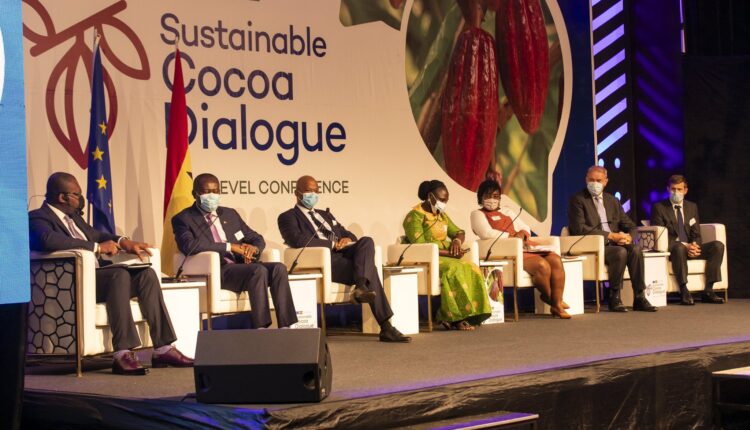The Executive Director of the International Cocoa Organisation (ICCO), Mr Michel Arrion, has reiterated calls for a unified cocoa sector sustainability agenda that prioritises fair pricing for cocoa growers.
Mr Arrion was among the speakers at the High-Level Sustainable Cocoa Dialogue between the European Union and Ghana, the second-largest cocoa producer nation.
According to the ICCO boss studies have shown that real living income borne out of a fair price for cocoa growers directly and positively impacts deforestation and child labour.
Mr Arrion said historical data indicated that cocoa bean prices in the 1970s hovered around $8000 per tonne, whereas current prices are a little above $2000.
He continued that around the same period 40years ago 50% of the price of a bar of chocolate went to the farmer regretting, however, only 6% of the price of the same bar of chocolate is paid to cocoa farmers today.

The Chief Executive of Ghana Cocoa Board, Joseph Boahen Aidoo, also intimated forcefully that fair pricing of cocoa beans and the provision of living incomes for cocoa farmers is key to sustainable cocoa farming.
Other speakers also agreed that decent income for cocoa farmers is the surest way to achieving real sustainability.
According to a World Economic Forum publication, Cocoa farmers in Ghana make $1/day, while those in Côte d’Ivoire make around $0.78/day—both significantly below the extreme poverty line. Farmers are often unable to bear the costs of cocoa farming as a result of low incomes.
Experts say the economic situation of cocoa farmers bears a direct correlation to the ills of the cocoa industry, chiefly deforestation and child labour.
Environmental advocacy groups have consistently raised concerns about alarming rates of deforestation in Ghana and Ivory Coast, repeatedly citing cocoa production to be the cause.
It is on this premise that the European Union is considering a due diligence legislation that promises zero-tolerance for deforestation and child labour in the supply chains of companies.
In keeping with the principle of engagement, the European Union office in Ghana led by Ambassador Diana Acconcia set up the Sustainable Cocoa Dialogue to solicit Ghana’s input prior to the ratification of the law.
Between April and June 10 this year, three successful sessions with various stakeholders in the Ghanaian cocoa sector have been held.
The final High-Level dialogue on 30 June 2021, in Accra, brought together all stakeholders from the government, COCOBOD, civil society, cocoa farmer cooperatives and the EU.
They took stock of the 2-month long dialogue in Ghana with the aim to draw conclusions on addressing four key areas: (i) elimination of child labour, (ii) enhancing the protection and restoration of forests, (iii) improving coordination of initiatives supporting the sector and (iv) to ensure a living income for the cocoa farmers.
The European Union’s Commissioner for International Partnerships, Jutta Urpilainen, connecting via video from Brussels announced that broad consultations on the legislation will end in September paving the way for the eventual passage of the legislation.
Mrs Urpilainen assured that the EU is committed to being part of solutions that will ensure the achievement of cocoa sector sustainability in the long term.
The cocoa sector, particularly in Ghana and Ivory Coast the world’s top two cocoa bean producers, faces pressure from sustainability campaigners, cocoa buyers and the European Union to address the alleged cocoa-induced deforestation and child labour.
But Ghana has maintained that cocoa production in the country has no role in deforestation, citing ample evidence that points to illegal small scale mining.
Ghana’s Minister for Lands and Natural Resources, Samuel Abu Jinapor, speaking at the opening of the final leg of the EU’s Cocoa Dialogue series catalogued ongoing interventions by his outfit to confront the wanton destruction of forest cover and cocoa farms by illegal mining activities.
He mentioned ‘Operation Halt‘ a military campaign against illegal miners, who are said to have destroyed thousands of acres of productive cocoa farmers, and also the Ghana Green Day initiative which saw the planting of five million trees across the country.
Also on the part of the Ghanaian government, the Minister for Food and Agriculture, Dr Owusu Afriyie Akoto, said Ghana and Ivory Coast are very committed to dealing with issues that inhibit the sector hence their joint initiative to cooperate on pertinent issues of mutual interest.
He said the joint cocoa cooperation body, Initiative Cacao Cote d’Ivoire-Ghana (ICCIG), was launched last week in Abidjan with its Secretariat based in Accra headed by former Mars Inc executive, Alex Arnaud Assanvo.
He identified the $400-per-tonne Living Income Differential (LID) as a direct result of the cooperation, which had raised the farmgate price in Ghana by 28% since October 2020.
He was disappointed though that, “nominally the LID is there, but it is being attacked at different angles by buyers and companies who are circumventing payment.”
Dr Akoto lamented that due to poor prices cocoa production in Ghana has in the last 40 years moved from a privileged business to becoming one of the least rewarding economic endeavours.
He noted that cocoa farmers are at the heart of production, cautioning that driving them into poverty poses the biggest threat to the sector’s sustainability.
The Agriculture Minister warned of rising cases of children of aged cocoa farmers are abandoning farming as a result of the unbridled poverty suffered by their parents.
- Illegal Mining Threatening Ghana’s $230M Cocoa Rehabilitation - April 10, 2024
- Ghana Raises Cocoa Farmgate Price by 58.26% to GHC2,070 per bag - April 5, 2024
- New Standard for Measuring Cocoa Household Income Launched - April 5, 2024
